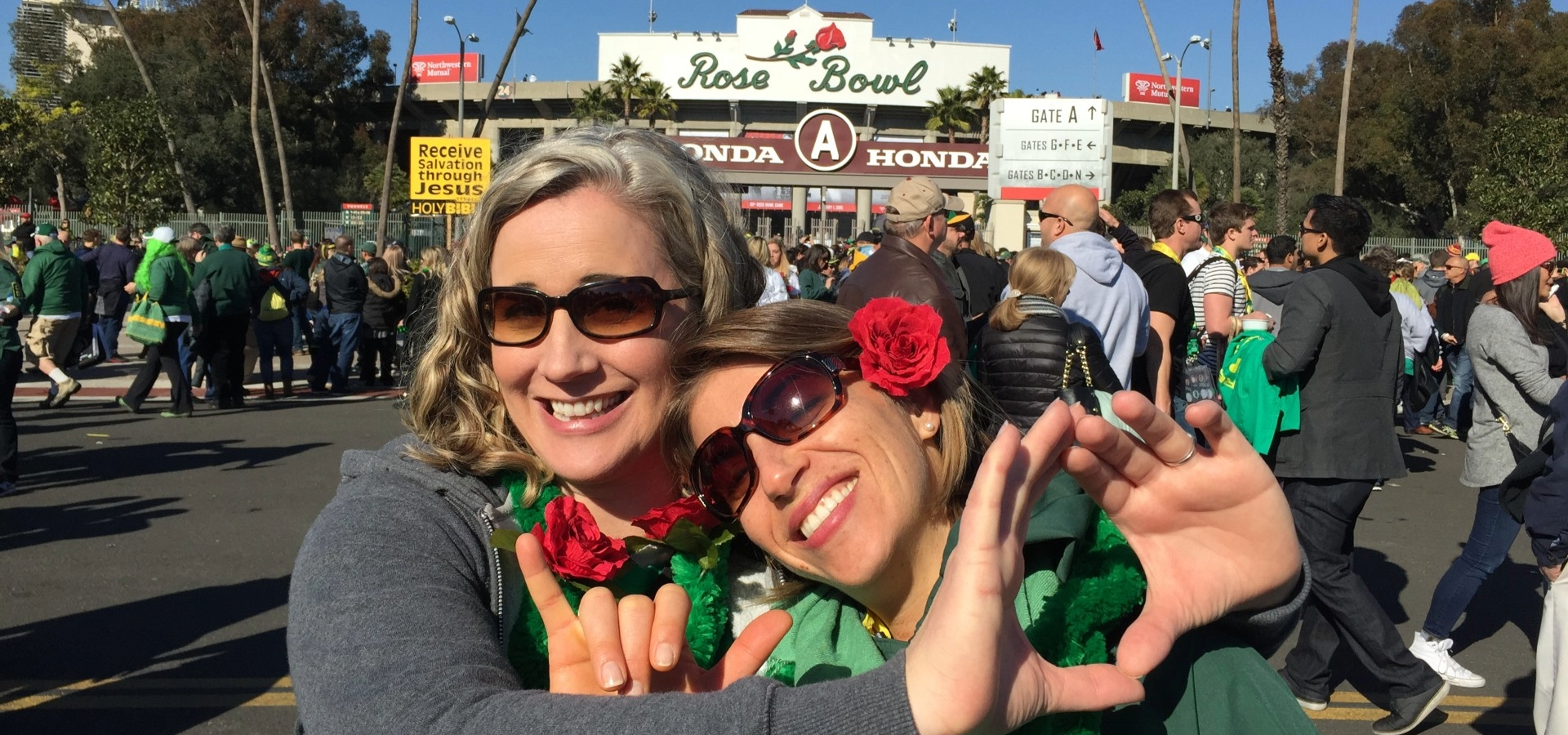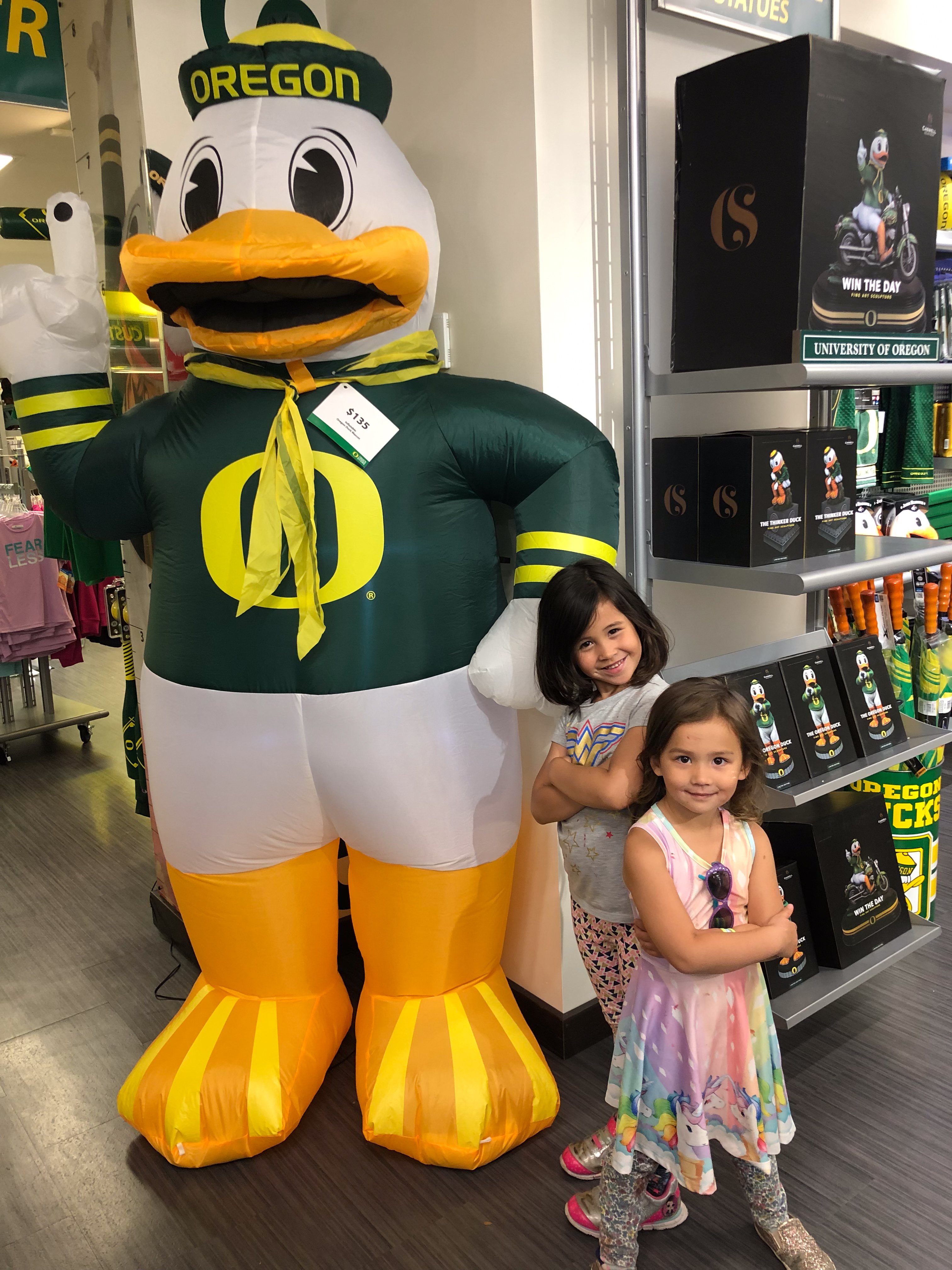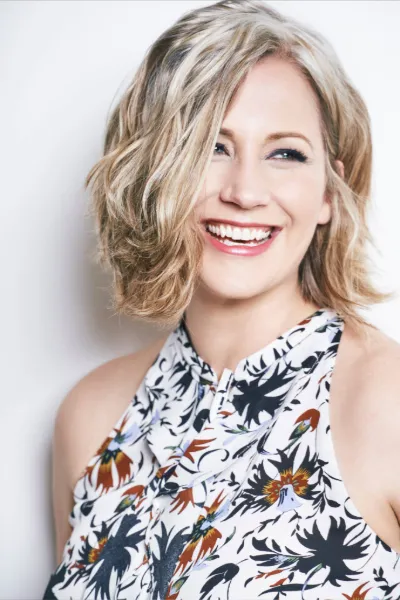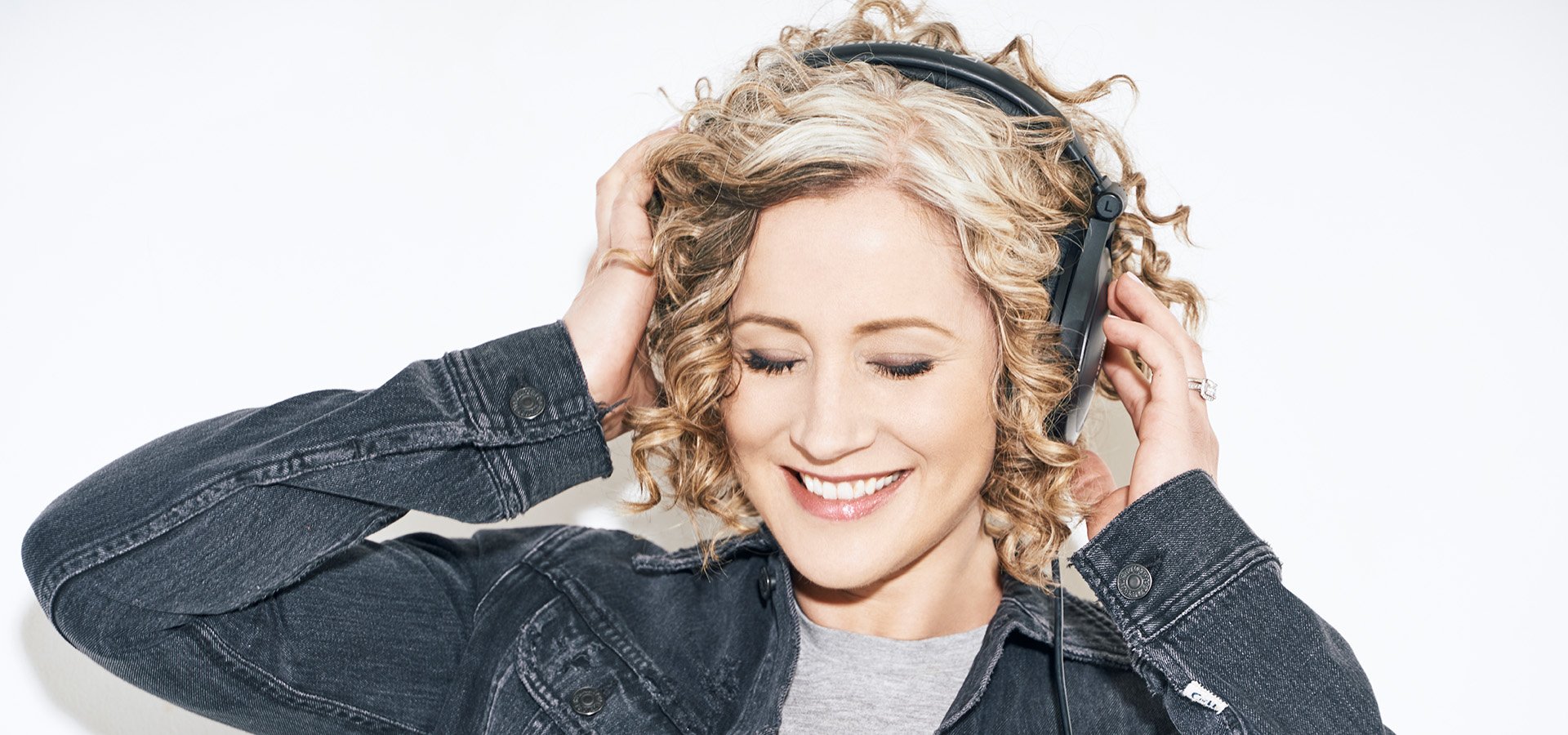In the studio with voice actor Cissy Jones
By April Miller, UO Alumni Association assistant director of marketing and communications
Cissy Jones, BA ’02 (business administration, Spanish), is an award-winning voice actor and CEO of ETHOVOX, an AI voice startup focused on ethically partnering with artists.
Years before Cissy Jones became an award-winning voice actor with acclaimed performances in video games like Firewatch and animations like Disney’s The Owl House, she was a recent UO graduate working in a Bay Area restaurant and trying to make her way in the world.
The Idaho native, who earned bachelor’s degrees in business administration and Spanish, ran into a friend at a graduation party who helped her land a job at a Palo Alto sushi restaurant.
“When I graduated in 2002, it was right after the dot-com bubble burst, and so it was the worst economy to try to find a job, and I didn’t want to live in my parents’ basement,” Jones said. “I moved to California on a wish and a prayer.”
More than two decades later, Jones is still in the Golden State, where she records voiceovers for video games, animations, commercials, promos, and more—primarily from her home studio booth in LA. Jones is best known for her roles as Delilah in the 2016 Indie game Firewatch—for which she received a 2017 BAFTA game award for Best Performance, Lillith Clawthorne in the Disney Channel animated series The Owl House, and nine different characters in Telltale’s The Walking Dead: The Game series.
She is a fierce advocate of protection for voice actors in the wake of generative AI. Since 2022, Jones has served as an advisory board member and AI steering committee member for the National Association of Voice Actors. In March 2024, she became the CEO of ETHOVOX, a company she co-founded to develop an ethical AI voiceover dataset that collaborates with artists and ensures fair compensation.
“[NAVA] put together the framework for how we want to see AI and voiceover coexist. [My ETHOVOX co-founder and I] realize no one is going to build it but us, and no one is going to do it better than us,” Jones said. “We're working on building truly innovative technology without exploitation of our voices, our art, and people.”

Cissy Jones (left) and Casey McGuire-Turcotte (right), class of 1999, in front of the Rose Bowl Stadium during the 2015 Rose Bowl. Jones and McGuire-Turcotte met at IntroDUCKtion in 1997.
Photo courtesy of Cissy Jones
A nontraditional path
Having grown up in Boise, Jones chose the UO for college based on its relative proximity to home. She originally planned to study marine biology, but quickly realized it wasn’t the right fit and changed her majors to business administration and Spanish. She said her experience at the university was hugely impactful.

Cissy Jones's two kids pose with an inflatable of the Duck during a visit to the UO's Eugene campus in 2018. Photo courtesy of Cissy Jones
“I have two children now and I talk to them a lot about how much fun that time was, really getting to learn who I was and what was important,” Jones said. “The diploma of course is of great importance, but the time learning who you are is just as important from a human standpoint. I'm so glad I chose the UO; it was one of the best decisions I've made.”
After graduation and her waitressing days, Jones put her business degree to use in Silicon Valley for nearly a decade. A partner at Sequioa Capital and his family frequented the restaurant where she worked, often sitting in Jones’s section. When an executive assistant position became available, he encouraged her to apply, and she landed the role.
“I just had the most incredible people that I worked with who really took the time to educate me. You have a business degree, but this is what it actually means. This is what you actually do in a practical application. So that was incredible.”
After two years at the venture capital firm, she was approached by an entrepreneur-in-residence, who invited Jones to join his startup company as their fourth hire. After several years, she then moved to another startup, where she quickly realized that the people you are surrounded with make all the difference. Unhappy with the direction her career was headed, Jones decided to make a change.
“I had a crisis of faith. I went on a trip with my now husband, and we were talking about dream jobs and what would be a dream job? I was like, ‘man, I don't know. I've always wanted to be a voice on The Simpsons, but you have to live in Hollywood.’”
Two weeks after that trip, Jones heard Nancy Cartwright, the voice of Bart Simpson, on the radio talking about voiceover as a career. In her radio interview, Cartwright mentioned a voiceover training school in San Francisco, which immediately captured Jones’s attention.
“I called that day. I started taking classes that week. I learned I had a knack for it, and two years later I was able to get an agent and quit my very well-paying job in the Silicon Valley and became an actor full time.”
Jones’s very first audition led to booking the role of Katjaa in The Walking Dead video game. With her voiceover career taking off, she and her family decided to move to Los Angelos in 2011, so Jones could have greater access to union auditions. Her first year in LA, Jones didn’t book a single role.
“It's not like the business world where people get promoted and their spot becomes available. I'm still competing and auditioning against the greats,” Jones said. “My confidence was shook—and as an actor, 90% of booking is having confidence. It really took a minute for me to reset, stop focusing solely on work, pay attention to myself and . . . build a life outside of this crazy dream.”
Making her mark on the industry
With persistence and hard work, Jones built a successful voiceover career in LA. About a year after relocating, she booked the voice of Southern California grocery chain, Ralph’s—a role she held for eight years. She also continued working in video games, booking additional roles in The Walking Dead game series and eventually, the role of Delilah in Firewatch.
From her home studio in LA, Jones recorded her lines as Delilah over video call with the game’s co-protagonist and director, Rich Sommer and Sean Vanaman, respectively. She said the process was fragmented, as the group would record a few times over the course of a week and then wait several months for more script to be written before recording again.
“It was fairly fragmented, but going back to [Delilah] was like putting on a pair of favorite shoes,” Jones said. “I knew who she was. I knew her snark and tone, and I knew how she felt about [male protagonist] Henry, and how Henry felt about her. It was just joy.
In addition to video games, Jones has made her mark on the animation industry, voicing the character of Lilith Clawthorne in The Owl House, which aired on Disney Channel from 2020 to 2023 and attracted a passionate fan base. She said voice acting for animation and video games provides the opportunity to speak to different audiences.
“To me, the biggest difference between animation and video games is that in animation you as a viewer are watching things happen to a group of people. The interconnectedness with the other characters is what is really important. To you, as a player of a video game, you are now part of this group. And so, my connection to the other characters has to be second to my connection to you.”
As someone who has always been interested in languages, having heard her parents speak Brazilian Portuguese growing up and earning a Spanish degree at the UO, Jones said she loves taking on the challenge of perfecting different accents. However, she explains that her job as a voice actor is so much more than the voice.
“There's so much that goes into building the character and understanding who they are before you put the voice on. I need to know what drives them.”
Innovating for a more ethical AI
As The Owl House grew in popularity during the COVID-19 pandemic, fans began creating their own scenes and posting them online with imitations of the character’s voices. It seemed innocent enough at first, until Jones said she came across her own voice saying words she had never recorded. Fans were using AI voice technology to put words in her mouth.
“I reached out to these [AI] companies, and I was like, ‘Hi, that's me. You don't have my permission to have my voice. Please remove it, especially because you're making money off it and I'm not seeing a dime. Please remove my voice.’ Some of them did, but most of them said, ‘No, you don't own your voice.’ You, as a human being on planet Earth, do not own the rights to your voice. True for me, it's true for you. It's true for Britney Spears. None of us own the rights to our voice.”
Alarmed by the lack of protections for creators, Jones began meeting with a group of like-minded friends and artists determined to advocate for change. She got involved with the National Association of Voice Actors, joining their advisory board and AI steering committee. In these roles, she has lobbied at both the state and federal levels.
“I'm so passionate about taking care of this community because the people that do voiceover—we don't do this to be famous. We do it because we love it,” Jones said. “For as many awesome things as [AI] does, it really has the potential to wipe out this business. I know some people don't care, and I get that. But I think it's worth fighting for.”
Jones’s latest venture is ETHOVOX, a company she co-founded with voice director and sound designer Julian Kwasneski. Working with fellow actors and artists, the startup has a goal of creating a more ethical data model for voice AI that collaborates with creators and is transparent about consent.
“We want to create our own properly licensed, fully responsible training data set,” Jones said. “It's going to take a lot of time and a lot of money, and so I am raising money from investors. The threading the needle part of it is they have to be investors that actually care about responsibility and ethics in AI. That's difficult because everybody wants huge ROI. I think there is huge ROI to be had, but I don't think we have to do it at the expense of an entire community. I think we can do it alongside an entire community.”
Jones called attention to the inherent biases perpetuated by generative AI—not just in voice but all mediums. Because voice datasets are based on historical information, Jones said they are not fully representative of the population that we hear every day. ETHOVOX has set out to build something that is more sonically diverse.
Cissy Jones clarified that it was the TAKE IT DOWN Act that passed the Senate unanimously, rather than the NO FAKES Act that she mentions in the video above. The NO FAKES Act is set to be reintroduced in the Senate.
Advice for a new generation of creators
When asked for her advice for the next generation of voice actors and creatives more broadly, Jones had one clear message.

“Read your contracts—my god, read your contracts and push back. You might not get the job, and that’s okay. There are a lot of predatory companies out there that don't care if you work again, but if they get that data subset, they don't need you anymore.”
Jones also recommended those specifically interested in voice acting to get plugged in with the National Association of Voice Actors and take classes that focus on how to be an actor because the job is so much more than talking.
“It's such a fun job, and there are so many different parts of the world that require voiceover. [For those] able to come in and bring a script to life, come play.”


